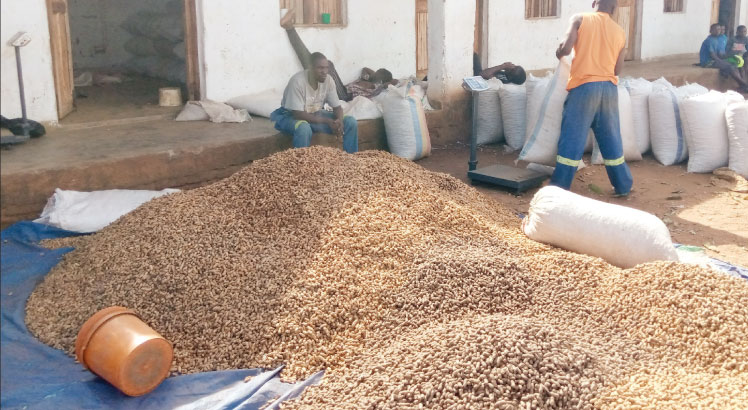Malawi’s development budget up 24 %
 Malawi’s development budget has moved upwards by 24 percent from the original K76.2 billion to a revised K94.5 billion while the total budget has moved 17 percent from K408.6 billion to K475.8billion.
Malawi’s development budget has moved upwards by 24 percent from the original K76.2 billion to a revised K94.5 billion while the total budget has moved 17 percent from K408.6 billion to K475.8billion.
Speaking in Parliament during the midterm budget review, Finance Minister Dr. Ken Lipenga said the proposals were made to adjust specific budget lines to ensure that there is smooth delivery of programmes to the end of the financial year.
“Total expenditure and net lending is now projected to rise from the approved budget estimate of K408.4 billion to K475.8 billion.
“Recurrent expenditures are expected to increase from the original estimate of K332.2 billion to K381.3billion and development budget expenditures are expected to increase from K76.2 billion to K94.5billion.
“And domestic debt repayment is projected at K18.8 billion which will reduce domestic debt stock to K170.0 billion from K188.8 billion, representing domestic debt repayment of 1.7 percent of GDP and hence surpassing the set minimum target of 0.5 percent of GDP,” said Lipenga.
The proposals represent a 24 percent increase in the development budget, 15 percent in recurrent and 17 percent in total budget.
Lipenga said the actual expenditures during the first half were within target and amounted to K242.6 billion, comprising recurrent expenditures of K191.3 billion and development expenditures of K51.3 billion.
He added that recurrent expenditures were below the targeted expenditure by K3.8 billion largely on account of reduced interest payments on domestic debt as a result of reduced government borrowing in the period under review.
He also pointed out that development expenditures also fell short of the target mainly on account of low donor disbursements for donor funded projects.
He noted that some expenditure lines experienced pressures in the first half of the financial year on account of the depreciation of the exchange rate which was passed through into higher prices.
Lipenga cited procurement of drugs and medical supplies, purchases of teaching and learning materials, payment for subscriptions to international organisations, operations of foreign missions abroad and resources for implementing the Farm Input Subsidy Programme (Fisp).
On revenue performance, Lipenga said government had performed well in the period under review. He said in the first six months, revenue target was K130.0 billion consisting of K113.5 billion tax revenues and K16.5 billion non tax revenues.
He added that domestic revenues were projected at K270.4 billion comprising K236.5 billion tax revenues and K33.9 billion non tax revenues.
“At the end of the first half of the fiscal year, actual outturn for domestic revenues was K133.8 billion of which K120.9 billion and K12.9 billion was tax and non tax revenues, respectively, representing an over performance of K3.9 billion. Tax revenues over performed by K7.5 billion while non tax revenues underperformed by K3.6 billion,” said Lipenga.
He explained that tax revenues over performed largely on account of the macro-economic factors such as the exchange rate adjustment and price increases.
He also attributed the performance to efficiencies in the tax administration system by the Malawi Revenue Authority.
He added that non tax revenues underperformed largely on account of shortfalls in fuel levies.
In terms of prospects to year end, total domestic revenues and grants are now projected at K461.4 billion, representing an upward revision from the K394.9 billion approved budget. Lipenga said, domestic revenues have been revised upwards to K278.9 billion from K 270.4 billion approved in the budget.
The revised targets comprise K243.8 billion tax revenues and K35.1 billion non-tax revenues.
He pointed out that the revision is due to revisions in the growth projections, exchange rate and inflation and efficiency gains in tax administration system.
On grants, the minister said in the period, they were projected at K109.6 billion comprising K50.6 billion programme grants, K37.4 billion dedicated grants and K21.6 billion project grants. He however said grants under performed by K5.6 billion largely on account of lower receipts from dedicated grants to National Aids Commission (NAC) and education sector support, as well as project grants.
“Against the projection of K109.6 billion, a total of K104.0 billion was received, of which K56.6 billion were programme grants, K29.4 billion were dedicated grants and K18 billion were project grants. The World Bank disbursed K13.7 billion; the African Development Bank K10.7 billion; the United Kingdom K10.3 billion as emergency budget support; the European Union K17.5 billion; and Germany K2.1 billion, also as emergency budget support.
“The Norwegian government re allocated the programmed budget support for the replenishment of the strategic grain reserves,” said Lipenga.
He added that the World Bank also disbursed K1.4 billion for the National Aids Commission (NAC) while Norway and Germany also disbursed K2.4 billion and K1.4 billion respectively for the Health sector SWAp.





